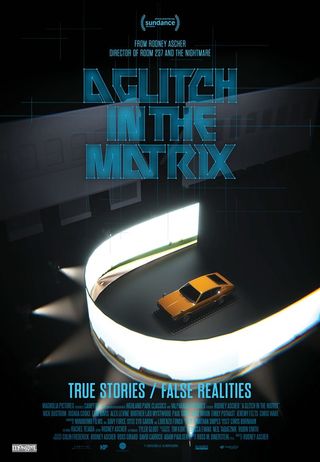Whether you'd swallow the red pill or the blue pill seen in 1999's "The Matrix," the idea of humanity actually living inside an alien-controlled artificial simulation is unsettling at best.
Though hardly a new hypothesis debated in fringe science circles and tackled in respected international universities, the notion has been gaining serious traction over the last two decades. Conventions and lectures on the subject enjoy spirited debates and host engaging crowds eager to indulge in the idea of this inconclusive sci-fi concept.
So is physical reality just an illusion, and do we all exist inside a digital universe? Lately, expanding ideas of simulation theory can be traced to noted Oxford University philosopher Nick Bostrom and his controversial 2003 paper titled, "Are you Living in a Computer Simulation?"
Now a new documentary by acclaimed filmmaker Rodney Ascher ("Room 237," "The Nightmare") explores this provocative topic in "A Glitch in the Matrix" (Magnolia Pictures), which recently hit Blu-ray and DVD with expert testimonials, philosophical evidence, and scientific explanations of simulation theory.
Related: The best sci-fi movies and TV shows to stream on Amazon Prime
Space.com connected with Ascher to hear how his new documentary project came about and what viewers can expect from this deep dive into the digital facsimile hypothesis that continues to generate intense philosophical interest.

Space.com: How did making this film either confirm your belief in simulation theory or make you question it?
Get the Space.com Newsletter
Breaking space news, the latest updates on rocket launches, skywatching events and more!
Rodney Ascher: Well there are two ways of looking at simulation theory, either as a scientific possibility that changes everything we think we know about the world around us or, secondly, as a metaphor. For the first, I believe I understand the premise after being immersed in the project for two years, but the idea still hasn't crossed the threshold of "extraordinary claims require extraordinary evidence" as best I can tell.
As a metaphor though, I see it as a very powerful way to describe the world and our place in it.
Space.com: How does popular entertainment like sci-fi films, anime, comics, and immersive video games help acclimate humanity into the notion of digital existence?
Ascher: Well, they visualize it, right? That makes it seem much more plausible. The late '90s gave us "The Matrix," "Dark City," "The Thirteenth Floor" and "eXistenZ" (among others) and you have to say that when things get difficult, the idea that it's not 'real' can be a handy pressure release if used in moderation.
A few people in the movie talk at length about video games and they do provoke a pretty profound question. Is there a comparable level above us that has the same relationship to us that we do to the video games we create and the characters we can interact with inside of?
Space.com: What were some of the more surprising or shocking elements of your research for this documentary?
Ascher: Well, certainly many of the details of the Josh Cooke story were shocking on their face, but my biggest surprise was how quickly interviewees went to religious and ethical places as they discussed the implications of simulation theory.
Space.com: Tossing aside things like coincidence, deja vu, and pattern recognition, what's the most convincing argument that we're living in God's video game?
Ascher: I'd say it was the elegance of Bostrom's three-part argument that suggested that if a fully real-seeming simulation was possible (and some of my experiences in VR feel like good evidence that it might be) it might have already happened.
Space.com: What's next on your creative plate moving into next year?
Ascher: I'm working on both scripted, narrative projects and more docs. The subjects range pretty widely, but they all feel like they're related in style or subject. Cursed Media is a recurring idea, but isn't necessarily part of every one. One idea is even a comedy.
In addition to its home video release, audiences can also catch "A Glitch in the Matrix" currently on Apple TV, Amazon Prime Video, Google Play, FandangoNOW, and DirecTV.
Follow us on Twitter @Spacedotcom and on Facebook.
Join our Space Forums to keep talking space on the latest missions, night sky and more! And if you have a news tip, correction or comment, let us know at: community@space.com.

Jeff Spry is an award-winning screenwriter and veteran freelance journalist covering TV, movies, video games, books, and comics. His work has appeared at SYFY Wire, Inverse, Collider, Bleeding Cool and elsewhere. Jeff lives in beautiful Bend, Oregon amid the ponderosa pines, classic muscle cars, a crypt of collector horror comics, and two loyal English Setters.
